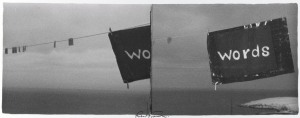‘How could human behavior be described? Surely only by sketching the actions of a variety of humans, as they are all mixed up together. What determines our judgment, our concepts and reactions, is not what one man is doing now, an individual action, but the whole hurly-burly of human actions, the background against which we see any action’
– Ludwig Wittgenstein, Zettel –
“CERTAIN NOVELS NOT ONLY cry out for critical interpretations but actually try to direct them . This is probably analogous to a piece of music that both demands and defines the listener’s movements , say like a waltz. Frequently, too, those novels that direct their own critical reading concern themselves thematically with what we might consider high brow or intellectual issues — stuff proper to art, engineering, antique lit., philosophy, etc. These novels carve out for themselves an interstice between flat-out fiction and a sort of weird cerebral roman à clef. When they fail, as my own first long thing did, they’re pretty dreadful. But when they succeed, as I claim David Markson’s Wittgenstein’s Mistress does , they serve the vital & vanishing function of reminding us of fiction’s limitless possibilities for reach & grasp, for making heads throb heartlike , & for sanctifying the marriages of cerebration & emotion, abstraction & lived life , transcendent truth -seeking & daily schlepping, marriages that in our happy epoch of technical occlusion & entertainment-marketing seem increasing consummatable only in the imagination”
-David Foster Wallace, The Empty Plenum-
IN THE PROCESS OF CHANGE


